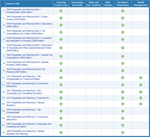|
Author: Jennifer Kowal
Description: |
|
||||||||||||
| |||||||||||||
Course Information
Expense or Capitalize?
Subscriber Discount
CCH® IntelliConnect™ and Accounting Research Manager® subscribers may be eligible for a special discount. Please contact your CCH representative at 1-800-449-8114 for information about the discount, or to purchase a subscription.
Course/Library Matrix

Use the Course/Library Matrix to get a quick view of all the courses in the Learning Center, and the Specialty Libraries that host them.
Helpful Links
Customer Service
To purchase a subscription,contact your CCH Account
Representative:
800-449-8114
Product Information or Technical
Support:
800-344-3734
Billing and Account Issues:
800-449-6439
For more information regarding administrative policies such as complaint resolution and refunds, please contact customer support at:
support.cch.com/csinquiry
800-344-3734
![[click to return to the previous page]](/resources/images/back_btn.gif)
![[click to buy this course]](/resources/images/buy_btn.gif)
![[click to download acrobat reader]](/resources/images/acrobat_btn.gif)
 Subscribe to our course listing
Subscribe to our course listing